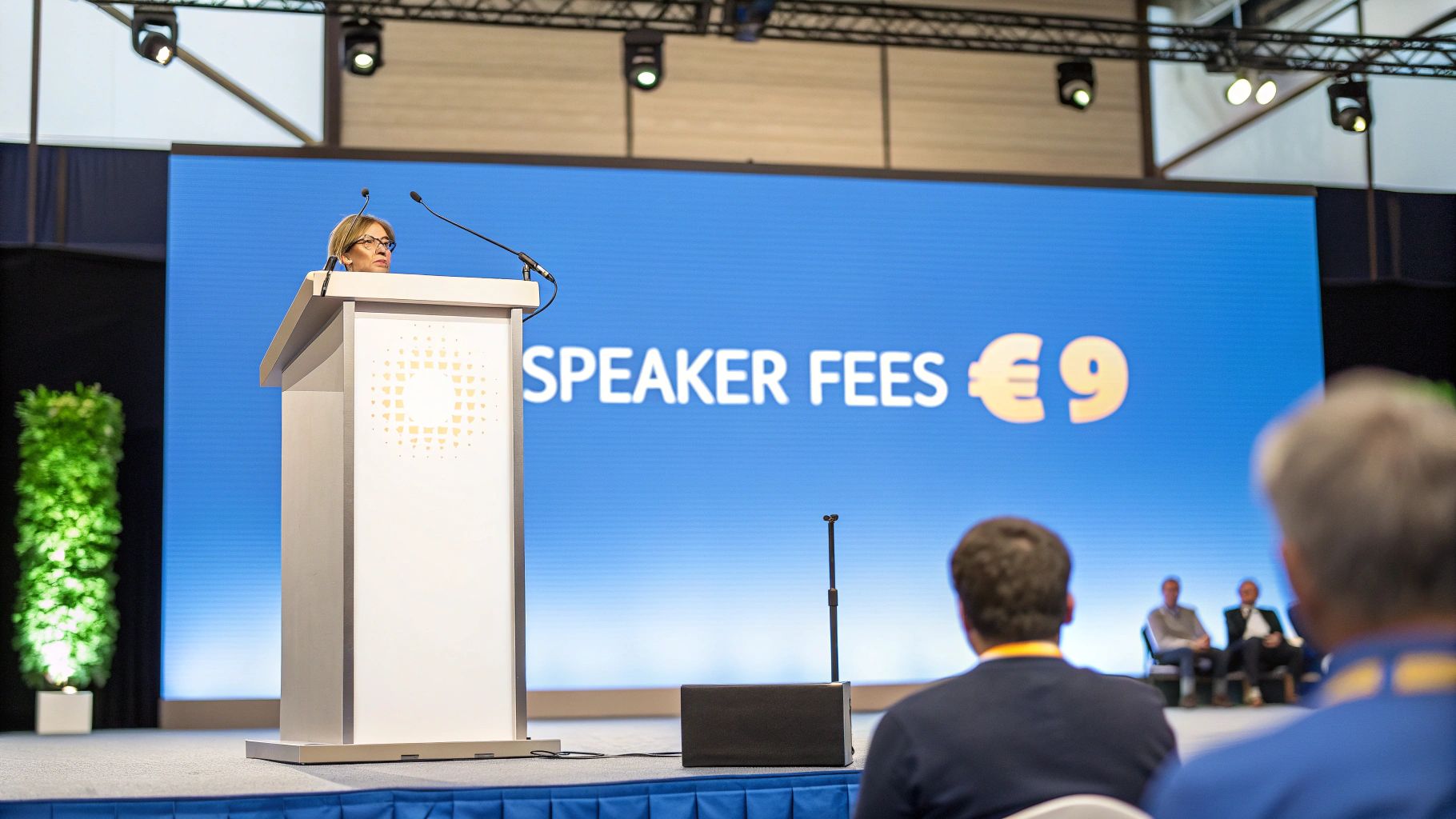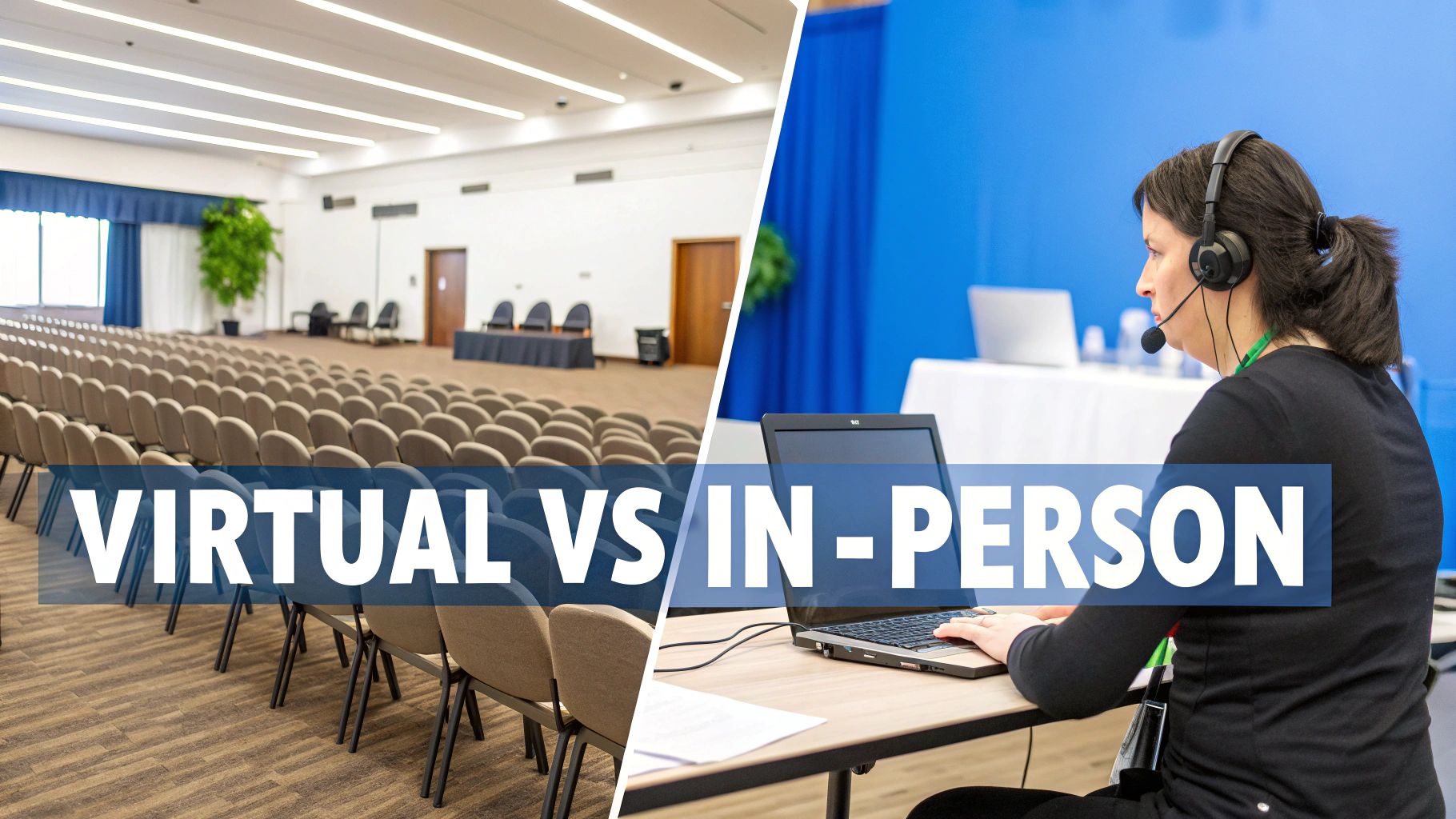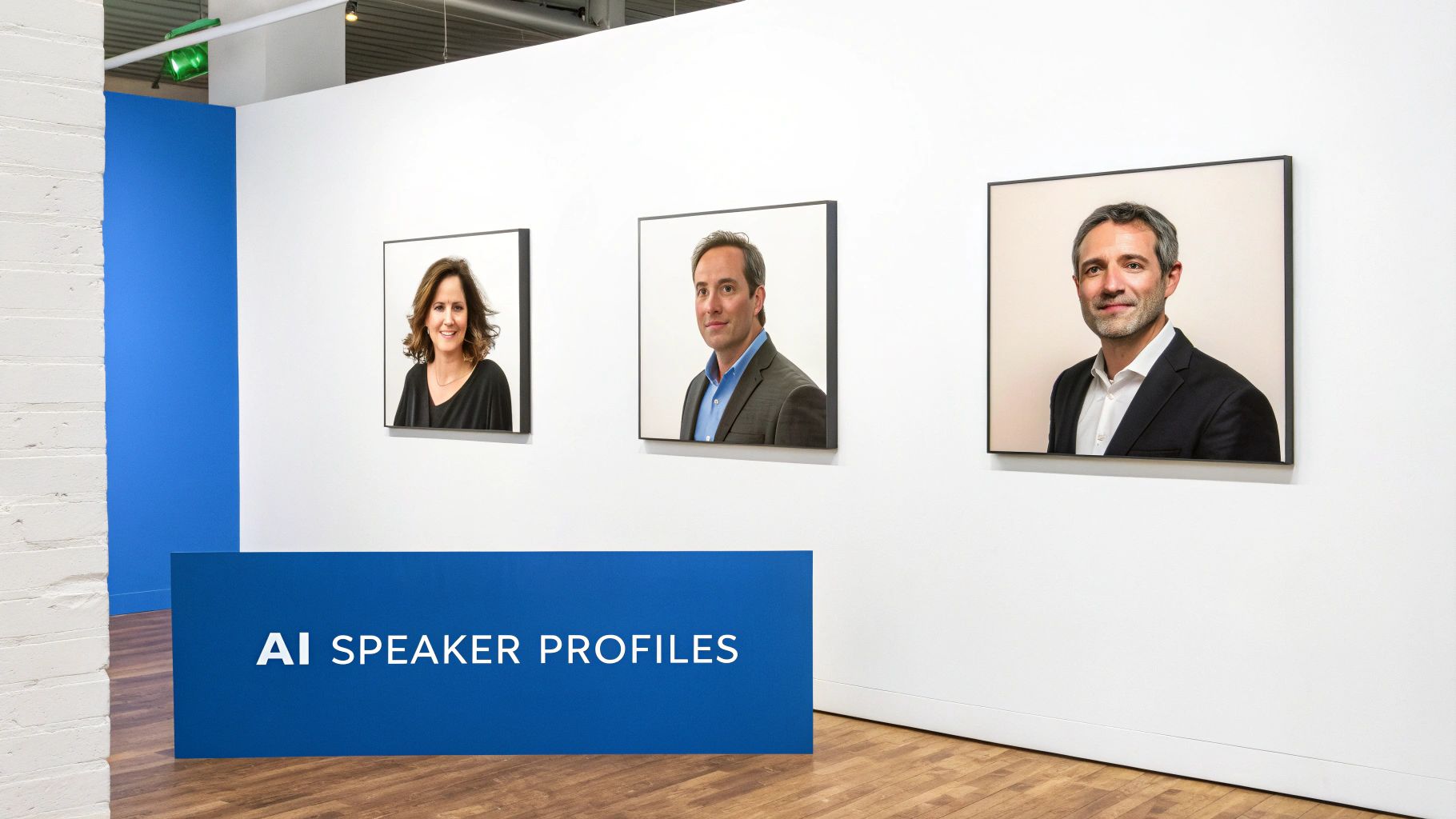Demystifying Conference Speaker Fees

Conference speaker fees can swing wildly, from $1,500 for an up-and-coming voice to over $300,000 for a celebrity keynote. But for most professional speakers you'll encounter, the sweet spot is between $5,000 and $50,000. The average for corporate events? That lands right around $26,000.
Getting a handle on this spectrum is the first step toward matching your budget with your event's ambitions.
How Much Do Conference Speakers Cost
When you're mapping out an event budget, understanding what really drives a speaker's fee is crucial. The price tag isn't just a random number; it's a direct reflection of their experience, demand, and the value they bring to your audience. Think of it like hiring any other expert—you expect to pay more for a seasoned pro. Speaker costs work the same way, scaling up with their reputation and power to pull in a crowd.
The keynote industry has become much more layered. While fresh voices might only charge a few thousand dollars, established professionals with a proven track record command significantly higher rates. Industry data shows the average keynote fee is around $15,551 for in-person events, but that number jumps to $26,582.88 for corporate and university conferences. It’s a clear sign of how much organizations invest in specialized expertise. You can dig into more data on how keynote speaker costs vary by event type.
Understanding the Tiers of Speaker Fees
To make sense of the numbers, it helps to break speakers down into a few distinct tiers. Each level represents a different kind of investment and delivers a different kind of punch for your event.
This infographic lays out the typical fee ranges you can expect for emerging, professional, and celebrity speakers.
As the chart shows, the leap between tiers is significant. It's a direct reflection of the speaker's brand recognition, audience pull, and their proven ability to captivate a room.
The fee you pay isn't just for the 60 minutes on stage. It's an investment in years of accumulated knowledge, research, and presentation mastery that your speaker brings to your event.
To give you a clearer picture, here’s a breakdown of what you can generally expect to pay for different types of speakers, whether they're joining you in person or beaming in virtually.
Typical Conference Speaker Fee Ranges
| Speaker Tier | Typical In-Person Fee Range | Typical Virtual Fee Range |
|---|---|---|
| Emerging Speaker | $1,500 - $7,500 | $1,000 - $5,000 |
| Professional Speaker | $7,500 - $25,000 | $5,000 - $15,000 |
| Established Expert | $25,000 - $75,000 | $15,000 - $50,000 |
| Celebrity / A-Lister | $75,000 - $300,000+ | $50,000 - $200,000+ |
As you can see, virtual events often come with a slightly lower price tag since they eliminate travel, but you're still paying for the speaker's expertise and preparation time.
What Is Included in a Standard Speaker Fee
When a speaker sends you a quote, that number usually just covers their prep time and the on-stage presentation itself. But that's almost never the total cost. You absolutely have to budget for the 'all-in' expenses that come with bringing them to your event.
Here’s what you should plan for on top of their speaking fee:
- Travel Costs: This typically means business-class airfare for any significant travel.
- Accommodations: A nice hotel room for the night before and the night of the event is standard practice.
- Ground Transportation: All rides to and from the airport and venue.
- Per Diem: A daily allowance for meals and other small expenses.
Forgetting to account for these "extras" can blow a hole in your budget fast. A solid rule of thumb is to add 20-30% on top of the speaker's base fee just to cover these associated costs. This gives you a much more realistic picture of your total investment from day one.
What Really Drives a Speaker's Fee?
Those initial fee ranges are a good starting point, but the final number on a contract is shaped by a handful of critical variables. You aren't just paying for an hour on stage. You're investing in the speaker's years of accumulated wisdom, their unique perspective, and their knack for delivering a message that sticks with people long after the applause fades.
Let’s pull back the curtain on the key elements that really move the needle on that final price.
Speaker Demand and Expertise
This is the big one. A speaker's fee is directly tied to their demand and the depth of their expertise. Someone who is a recognized authority in a hot-button field like artificial intelligence naturally commands a higher price than a generalist motivational speaker. Their specialized knowledge is a scarce resource, and that creates a premium.
A speaker’s reputation and track record also play a massive role. An expert who consistently sells out conference halls and racks up glowing testimonials has proven their value time and time again.
A speaker's fee is a direct reflection of their market value. It's determined by how many event planners want them, how few available dates they have, and the tangible results they deliver for an audience.
It's no surprise that different industries see different price points. Tech and business conference speakers often command premium fees, with top futurist speakers talking about AI trends pulling in $50,000 or more for a single event. To see exactly how these factors connect, check out this complete breakdown of what keynote speakers charge.
The Level of Content Customization
The amount of tailoring you ask for has a direct impact on the fee. A speaker's standard keynote is their most practiced talk, but most events need at least a little customization to make the content land perfectly with the audience.
Here’s a simple way to think about how customization affects the cost:
- Standard Keynote: The speaker delivers their core presentation with minor tweaks, like dropping in the company name. This requires the least prep time.
- Customized Presentation: A bigger lift. The speaker might weave in industry-specific data or address internal company challenges, requiring research and a redesigned slide deck.
- Fully Bespoke Content: The speaker builds a brand-new presentation from the ground up, often involving extensive interviews with your key stakeholders. This is the highest level of investment.
The more you ask a speaker to adapt their material, the more time and brainpower they have to invest. It’s only fair that their fee reflects that extra work.
Engagement Type and Scope
Finally, what you ask the speaker to do beyond the main stage will influence the final cost. A single 60-minute keynote is the standard, but smart event planners often maximize their investment by adding other activities.
Just think about how quickly the scope can expand:
- Panel Moderation: This requires a completely different kind of preparation to manage a conversation with multiple people.
- Breakout Sessions or Workshops: A hands-on workshop is a much deeper engagement that demands more prep and a different skillset.
- VIP Dinners or Meet-and-Greets: Extra face-time with executives or sponsors is valuable and almost always billed as an additional appearance.
- Book Signings: While some speakers might include this as a courtesy, others will charge for the time.
Each of these commitments takes up more of the speaker’s time and energy, so be ready for these "add-ons" to increase the total fee. Be crystal clear about the full scope of your expectations upfront to get a truly accurate quote.
Virtual Vs In-Person Pricing Differences
The format of your event is one of the biggest levers you can pull to manage your budget. Opting for a virtual engagement over an in-person one can dramatically change the speaker fee, often making world-class experts surprisingly accessible.
The reason is simple: logistics. An in-person keynote involves travel days and time away from other work. A virtual keynote boils that commitment down to just a few hours.

That efficiency translates directly into major cost savings for you.
The Financial Impact of Going Virtual
When you book a speaker for a physical event, their fee is just the starting point. A virtual event simply wipes travel-related expenses off the board.
- No Airfare or Travel Costs: You avoid paying for business-class flights that can run into thousands of dollars.
- No Accommodation Expenses: Hotel rooms in major conference cities are a hefty line item that just disappears.
- No Ground Transportation or Per Diems: The need to cover taxis, meals, and other daily expenses is gone.
This shift creates a powerful opportunity. The money you save on logistics can be put toward securing a more prominent speaker without blowing up your budget.
Accessing Top-Tier Talent for Less
It's not just about saving money—the reduced logistical hassle also makes speakers more available. A top expert might only have a few days a month for in-person travel, but they can often fit several virtual keynotes into that same window.
This increased availability almost always leads to more competitive pricing. In fact, virtual event speaker fees are often 50 to 70 percent less than what the same speaker would charge for an in-person appearance.
That's a massive reduction that opens the door for organizations to book industry leaders they previously thought were out of reach. For emerging experts, virtual fees between $500 and $2,000 make them a fantastic choice for events on a tighter budget.
By embracing a virtual format, you're not just cutting costs. You're strategically expanding your access to a wider, more influential pool of experts and maximizing the impact of your speaker budget.
This approach lets you focus purely on the value of the speaker’s message. For more strategies, check out our guide on how to ensure you have a successful online event with a virtual keynote speaker.
Meet Our AI Speakers and Their Fee Ranges
Seeing how fees connect to real-world experts makes it all click. Let's move from abstract price tags to tangible examples from our roster of leading AI professionals, whose fees reflect their specific value and experience.
Below are a few profiles from our network, showing the different investment levels for securing top-tier AI talent.

This is a gallery to help you connect your event's theme and budget with the right kind of expert.
The Visionary Futurist: Dr. Anya Sharma
As a former lead AI ethicist at a major tech firm, Dr. Anya Sharma is a sought-after voice on the future of responsible AI. Her keynotes dive deep into how artificial intelligence will reshape society, industry, and daily life, making her the perfect choice for C-suite executives and policymakers.
- Area of AI Expertise: AI Ethics, Societal Impact, and Long-Term AI Strategy.
- Typical Engagement: A 60-minute forward-looking keynote plus an in-depth 30-minute Q&A with executive teams.
- Typical Fee Range (In-Person): $35,000 - $50,000
The Applied AI Strategist: Ben Carter
Ben Carter demystifies AI and turns complex ideas into actionable business strategies. With over a decade of experience implementing machine learning for Fortune 500 companies, his presentations are packed with real-world case studies and practical frameworks that marketing, sales, and operations teams can use immediately.
- Area of AI Expertise: Applied Machine Learning, Generative AI for Business, and AI-Driven Marketing.
- Typical Engagement: A 45-minute tactical keynote followed by a hands-on, 90-minute workshop for a specific department.
- Typical Fee Range (In-Person): $20,000 - $35,000
The Emerging Innovator: Maria Flores
Maria Flores represents the next wave of AI talent. As the founder of a successful AI startup, she offers a fresh perspective on how new tools empower businesses. Her talks are accessible, engaging, and incredibly motivational for aspiring tech leaders and audiences looking for stories of innovation.
- Area of AI Expertise: Natural Language Processing (NLP), AI Startups, and Practical Generative AI Tools.
- Typical Engagement: A dynamic 45-minute keynote presentation and participation in a subsequent panel discussion.
- Typical Fee Range (In-Person): $10,000 - $20,000
These examples all point to a key principle: the investment level directly corresponds to the speaker's specific expertise, demand, and the strategic value they deliver. The fee isn't just for an hour on stage—it's for access to years of specialized experience.
While looking at conference speaker fees, it can be helpful to see how costs are set for related AI services. For example, understanding the pricing models for AI-powered tools offers a useful parallel, like in this guide on decoding the cost of transcription services.
Speak About AI Roster Examples
To give you a clearer picture, here is a snapshot of our speakers, their areas of expertise, and typical investment levels for a standard keynote.
| Speaker Profile | Area of AI Expertise | Typical Fee Range (In-Person Keynote) |
|---|---|---|
| The Visionary Futurist | AI Ethics, Long-Term Strategy, Societal Impact | $35,000 - $50,000+ |
| The Applied AI Strategist | Business Implementation, ROI, Machine Learning | $20,000 - $35,000 |
| The Emerging Innovator | AI Startups, NLP, Practical GenAI Tools | $10,000 - $20,000 |
Speaker Profile | Area of AI Expertise | Typical Fee Range (In-Person Keynote)
This table helps illustrate how different types of expertise align with different budget levels, making it easier to identify the right profile for your event.
These speakers are just a small sample of the talent we work with. Every expert on our roster has been vetted for their deep knowledge and ability to deliver a compelling, impactful presentation. To find the perfect match for your event's needs and budget, you can browse our full roster of AI speakers at https://speakabout.ai/speakers. Our goal is to connect you with an expert who doesn't just talk, but inspires real action.
Budgeting and Negotiating Your Speaker Agreement
You've got a handle on what speakers generally charge. Now comes the real work: turning that number into a signed contract. This part is less about haggling and more about smart planning and thoughtful negotiation to unlock value that goes way beyond the keynote itself.
Building a Comprehensive Speaker Budget
The speaker's fee is the main event, but it's rarely the final number. To avoid financial surprises, you have to account for all associated costs. A common mistake is forgetting these "add-ons," which can easily inflate your total investment by 20-30%.
Here’s a quick checklist to get you started:
- Speaker’s Fee: The base cost for their expertise and presentation.
- Travel Costs: This usually means business-class airfare.
- Accommodations: A quality hotel room for at least the night before and of the event.
- Ground Transportation: All rides between the airport, hotel, and your venue.
- Meals & Per Diem: A daily allowance to cover their food and incidental expenses.
- Technical Rider: Any specific A/V gear the speaker requires.
- Marketing Support: Costs for professionally designed promotional materials.
Mapping this out upfront means you walk into negotiations knowing your total financial commitment.
Mastering the Art of Negotiation
Negotiating with a professional speaker isn’t about lowballing them. In fact, most top speakers are firm on their fees. The real art is in creating more value for the fee you’re already paying. This collaborative approach almost always leads to a better outcome.
Smart negotiation isn’t a battle over cost; it’s a creative conversation about value. The goal is to expand the partnership, not just shrink the price tag.
Before making an offer, figure out what extra contributions would be most valuable. Here are a few value-adds you can often negotiate for:
- Book Signing Session: A fantastic way to give attendees a personalized takeaway.
- Social Media Promotion: Ask the speaker to promote their session to their followers to boost marketing reach.
- Pre-Event Content: A short video or blog post from the speaker can build excitement.
- Multiple Booking Discount: Ask about a reduced rate for booking them for more than one engagement.
- Workshop or Q&A: See if they'd be willing to lead a smaller breakout session or join an exclusive Q&A.
Finalizing the Speaker Agreement
Once you’ve settled on the fee and extras, get it all in writing. The speaker agreement is a critical document that protects both parties by clearly laying out every expectation.
Don't just skim it—pay close attention to the details. Key clauses to look for include:
- Payment Schedule: Know the due dates for the deposit (typically 50% upfront) and the final balance.
- Cancellation Policy: Understand what happens financially if you have to cancel, or if they do.
- Recording Rights: The contract needs to be clear about whether you can record the session and how you can use the footage. Some speakers charge an extra licensing fee for this.
- Travel and Logistics: It should specify who books and pays for travel and accommodation.
Nailing down these points ensures a smooth and professional engagement from start to finish.
The Strategic Value of a Speaker Bureau
Trying to find the right conference speaker can feel overwhelming. Working with a speaker bureau isn’t about adding a middleman—it’s about bringing in a specialist who turns that chaotic search into a smart, strategic process.
A bureau does for your event what an expert real estate agent does for your home search: we live and breathe the market, have access to top talent, and know exactly how to match your needs to the perfect speaker.
Saving Time and Mitigating Risk
During event planning, your time is gold. A speaker bureau gives that time back to you by providing a curated shortlist of vetted experts based on your goals, audience, and budget. You get a handful of proven pros who are guaranteed to be a great fit.
That vetting process is everything. A bureau ensures every speaker we recommend is a polished professional with a solid track record. This removes the risk of hiring an unknown who might fall flat, saving you from a cringe-worthy moment. We handle the due diligence so you can focus on the big picture.
Access and Negotiation Expertise
One of the biggest perks of using a bureau is tapping into a premier network. At Speak About AI, we have personal relationships with leading voices in artificial intelligence you might not be able to find on your own. Those connections mean we can get you in front of top-tier talent and skillfully navigate their schedules.
Better yet, we handle all the negotiation and contracting. With our deep knowledge of conference speaker fees and industry standards, we secure favorable terms that go beyond just the fee. We can often arrange valuable add-ons like book signings or workshops, ensuring you get the most from your investment. For a deeper dive, check out our post on why using a speakers bureau is a strategic advantage.
A speaker bureau acts as your strategic partner, transforming the complex task of finding a speaker into a simple, efficient, and risk-free process that guarantees a successful outcome for your event.
Ultimately, a bureau is a powerful investment in your event’s success. We make sure your speaker doesn't just show up—they deliver an unforgettable message that resonates long after the applause fades.
Common Questions About Conference Speaker Fees
Even after you've nailed down a budget, a few questions about speaker fees always seem to pop up. Let’s clear up the most common queries we get from event planners.
Are Conference Speaker Fees Negotiable?
Yes, they often are—but probably not in the way you’re thinking. Instead of haggling for a lower price, the best negotiations focus on adding more value.
For example, rather than asking an AI expert like Ben Carter to slash his fee, you could propose he host a private 20-minute Q&A with your executive team. This way, you get more for your money, and the speaker maintains their pricing integrity. It’s a win-win. A good speaker bureau is your best ally here; they have the relationships to craft a package that gives you the most bang for your buck.
What Costs Should I Budget for Besides the Fee?
The quoted fee is the main event, but it's rarely the final number. To avoid any surprises, you need to budget for the "all-in" cost. A safe bet is to add an extra 20-30% on top of the speaker's fee to cover all the associated expenses.
Think of it like this: the fee gets them to the city, but these costs get them to the stage.
- Travel: This usually means business-class airfare.
- Lodging: A hotel room for the night before and the night of their talk.
- Ground Transportation: All the rides in between—airport transfers, hotel to venue, etc.
- Per Diem: A daily allowance for meals and small expenses.
How Far in Advance Should I Book a Speaker?
For the big names, especially visionary futurists like Dr. Anya Sharma, you'll want to lock them in 6 to 12 months in advance. This is doubly true if your event falls during the jam-packed spring or fall conference seasons. For other professionals, a 3 to 6-month lead time is usually enough.
Booking early isn't just about securing your top choice. It’s a massive marketing advantage. You get to splash your headliner across all your promotional materials, driving ticket sales and building serious buzz months before the doors even open.
Ready to find the perfect AI expert to energize your next conference? Speak About AI takes the guesswork out of the entire process. We connect you with world-class talent and handle all the logistics, so you can focus on creating an unforgettable event.
